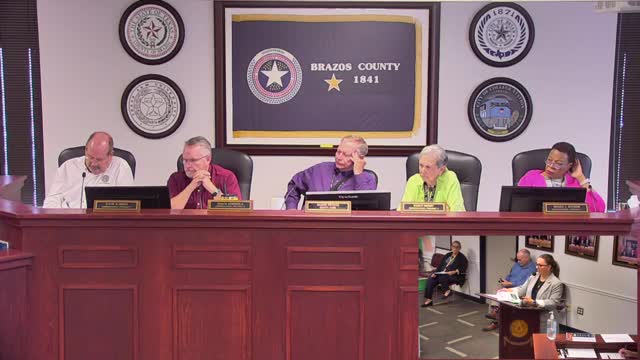Transit Funding Crisis Forces Tough Choices for Local Services
August 08, 2024 | Brazos County, Texas
This article was created by AI summarizing key points discussed. AI makes mistakes, so for full details and context, please refer to the video of the full meeting. Please report any errors so we can fix them. Report an error »

In a recent government meeting, officials discussed the significant challenges facing local transit funding, particularly in light of a 38% reduction in state funding, which has dropped to $650,000. The funding formula, heavily influenced by population density and miles driven, has placed the community at a disadvantage compared to larger urban areas like Chicago and New York, which benefit from additional taxing authority.
The local transit agency, currently employing about 120 staff members, is grappling with the need to either secure additional funding or make cuts to services and personnel. With 75% of employees based in Bryan College Station, the agency is seeking $334,000 from Brazos County to maintain current service levels. The funding cuts are attributed to census changes, which have altered the agency's financial landscape.
Officials expressed frustration over the lack of initiatives at the federal level to address funding gaps for communities like theirs. The current funding structure, which relies on previous years' savings and state funds, has left the agency in a precarious position, especially as they often do not receive confirmation of federal funding until halfway through the fiscal year.
The discussion also highlighted the unique position of the local transit system, which does not receive local government funding—a stark contrast to other Texas transit agencies. This absence of local support has made it difficult to maintain operations without increasing fares, which officials argue are not a sustainable solution.
Advocacy for improved public transit funding is ongoing, with various groups attempting to influence state budget allocations. Officials noted that public transit in Texas is often funded with minimal resources, and there is a pressing need for legislative action to secure more substantial financial support.
The meeting concluded with a call for collaboration among local officials to engage with advocacy groups and state representatives to explore potential funding solutions, emphasizing the importance of public transit for economic growth and community accessibility.
The local transit agency, currently employing about 120 staff members, is grappling with the need to either secure additional funding or make cuts to services and personnel. With 75% of employees based in Bryan College Station, the agency is seeking $334,000 from Brazos County to maintain current service levels. The funding cuts are attributed to census changes, which have altered the agency's financial landscape.
Officials expressed frustration over the lack of initiatives at the federal level to address funding gaps for communities like theirs. The current funding structure, which relies on previous years' savings and state funds, has left the agency in a precarious position, especially as they often do not receive confirmation of federal funding until halfway through the fiscal year.
The discussion also highlighted the unique position of the local transit system, which does not receive local government funding—a stark contrast to other Texas transit agencies. This absence of local support has made it difficult to maintain operations without increasing fares, which officials argue are not a sustainable solution.
Advocacy for improved public transit funding is ongoing, with various groups attempting to influence state budget allocations. Officials noted that public transit in Texas is often funded with minimal resources, and there is a pressing need for legislative action to secure more substantial financial support.
The meeting concluded with a call for collaboration among local officials to engage with advocacy groups and state representatives to explore potential funding solutions, emphasizing the importance of public transit for economic growth and community accessibility.
View full meeting
This article is based on a recent meeting—watch the full video and explore the complete transcript for deeper insights into the discussion.
View full meeting
